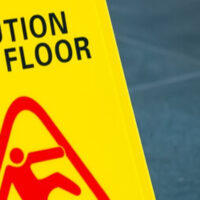Slip and Fall Accidents – What is the Liability of the Retail Business?

Slips, trips, and falls are common, and tens of thousands of individuals are injured in these types of accidents each year. A lot of slip and fall accidents are minor and cause only a small scrape or bruise. There are many others, however, that result in more serious and catastrophic injuries. Some of the more severe injuries that can happen as a result of slips and falls include:
- Head Injuries: According to the Centers for Disease Control, falls account for nearly half of all traumatic brain injuries (TBI). TBI from falls disproportionately affects younger children and the elderly.
- Spinal Cord and Back Injuries: The impact of a slip and fall can cause a slipped or herniated disc or fractured vertebrae, which can result in extreme pain and limited mobility.
- Shoulder Injuries: Slips, trips, and falls can cause a dislocated shoulder, or a shoulder injury known as “brachial plexus”. These types of injuries are very painful and often require surgery and an extensive rehabilitation period.
- Hip Fractures: Approximately 95% of hip fractures are caused by falling. As is the case with TBI, this type of injury is most common among the elderly.
Slip and Fall Accidents in Retail Businesses
Slips, trips, and falls happen commonly at retail establishments. When a fall happens on the premises of another party, that party can be held liable for any injuries that may occur. Here are some common areas where a slip and fall accident can occur at a retail business:
Floors
A retail business needs to maintain their floors, and this means mopping and waxing them on a regular basis. If a slip and fall accident occurs because of a wet floor, the retail store can be held responsible in certain circumstances; such as failing to adequately warn customers of the wet floor, failing to provide adequate barriers to close off the wet area, failure to use the required floor treatment, using an excessive or uneven amount of wax or polish, and many others. Other hazardous flooring conditions that may lead to a falling accident include torn carpeting, broken, bulging, or sharp areas of the carpet, and uneven surfaces.
Stairways
Stairs are often constructed out of material that becomes worn after continual use over an extended period of time. The retail business may be liable for a slip and fall accident on a stairway if the owner/manager was aware of the hazardous condition that led to the injury, or the condition existed for long enough that they should have been aware of it. Examples of stairway hazards include broken or missing handrails, steps that are worn, rounded, or have holes in them, and loose materials and/or debris that is present on the stairs.
Escalators/Elevators
Escalators and elevators are machine-powered, and when the machinery malfunctions, the situation can become especially dangerous. Slip and fall accidents have been known to happen in an escalator or elevator because of unexpected, sudden, and/or jerky movements caused by faulty machinery. It is the responsibility of the store owner or manager to maintain this equipment and ensure that it does not pose a danger to customers.
When is the Retail Business Liable for a Slip and Fall Accident?
A retail business owes a high duty of care to customers who enter their establishment. This means that the owner or caretaker of the property is obligated to take reasonable steps to ensure that the store is free from hazards, and to warn customers of any hazards that may exist. If a slip and fall accident occurs, the business can be held liable if they created the hazardous condition that caused it, or if they were aware of the condition (or should have been aware of it) but did not take steps to address it.
In these types of cases, the burden of proof is on the injured party to show that the retail store is responsible for the injury. The store is likely to argue that it is the injured party’s fault for walking where they weren’t supposed to be, or that the condition was “open and obvious” to a reasonable person. If you or someone close to you was injured in a slip and fall accident at a retail establishment, be sure to obtain as much documentation as you can about the injury.
Take multiple photographs of the scene from different angles to clearly show the condition that caused it. In addition, obtain the contact information of those who witnessed the incident, and write down in as much detail as possible what happened while everything is fresh in your mind. Finally, get in contact with a skilled personal injury attorney to discuss the details of the incident, so you can find out whether or not you have a case.
Speak with an Experienced Kentucky Premises Liability Lawyer
At the law offices of John H. Ruby & Associates, we have successfully represented countless clients who have been injured in slip and fall accidents in Kentucky. We have extensive knowledge of this area of law, and how Kentucky’s comparative negligence standard can impact the outcome of these types of cases. We provide free initial consultations, and we take all personal injury cases on a contingency fee basis, so you never have to pay upfront attorney fees to receive the skilled and personalized legal representation you need and deserve.
To schedule your free initial consultation with one of our seasoned attorneys, call our office today at 502-895-2626. You may also send a secure and confidential message through our online contact form or stop by our Louisville office in person.
